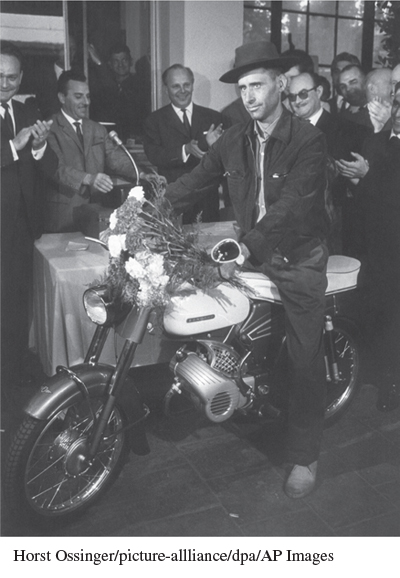A History of Western Society: Printed Page 974
A History of Western Society, Concise Edition: Printed Page 977
Individuals in Society
Armando Rodrigues

P opping flashbulbs greeted Portuguese worker Armando Rodrigues when he stepped off a train in Cologne in September 1964. Celebrated in the national media as West Germany’s 1 millionth guest worker, Rodrigues was met by government and business leaders — including the Christian Democratic minister of labor — who presented him with a motorcycle and a bouquet of carnations.
In most respects, Rodrigues was hardly different from the many foreign workers recruited to work in West Germany and other northern European countries. Most foreign laborers were nobodies, written out of mainstream historical texts and treated as statistics. Yet given his moment of fame, Rodrigues is an apt symbol of a troubled labor program that helped turn Germany into a multiethnic society.
By the late 1950s the new Federal Republic desperately needed able-
For labor migrants, life was hard in West Germany. In the first years of the guest worker program, most recruits were men between the ages of twenty and forty who were either single or willing to leave their families at home. They typically filled low-
West Germans gave Rodrigues and his fellow migrants a mixed reception. Though they were a welcome source of inexpensive labor, the men who emigrated from what West Germans called “the southern lands” faced discrimination and prejudice. “Order, cleanliness, and punctuality seem like the natural qualities of a respectable person to us,” wrote one official in 1966. “In the south, one does not learn or know this, so it is difficult [for a person from the south] to adjust here.”*
According to official plans, the so-
Despite the hostility they faced, foreign workers established a lasting and powerful presence in West Germany, and they were a significant factor in the country’s swift economic recovery. More than fifty years after Rodrigues arrived in Cologne, his motorcycle is on permanent display in the House of History Museum in Bonn. The exhibit is a remarkable testament to one man’s history, to the contribution of migrant labor to West German economic growth, and to the ongoing struggle to come to terms with ethnic difference and integration in a democratic Germany.
QUESTIONS FOR ANALYSIS
- How did Rodrigues’s welcome at his 1964 reception differ from the general attitude toward guest workers in Germany at the time?
- What were the long-
term costs and benefits of West Germany’s labor recruitment policies?